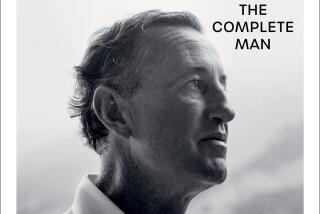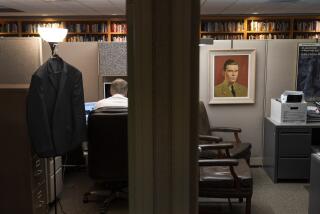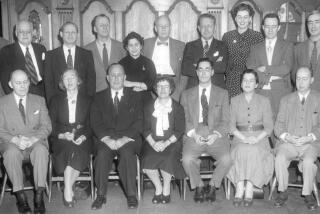The Cambridge Apostles : A HISTORY OF CAMBRIDGE UNIVERSITY’S ELITE INTELLECTUAL SECRET SOCIETY <i> by Richard Deacon (Farrar, Straus & Giroux: $17.95; 224 pp., illustrated) </i>
- Share via
“The Cambridge Apostles”--many Americans became aware of this venerable semi-secret society of Cambridge University only during the 1980s, when many of the British elite then being exposed as long-time agents for the Soviet Union were also found to have something else in common: While Cambridge undergraduates, they had been Apostles. Richard Deacon, a popular British writer on espionage with more than 50 books to his credit, has now written a history of the Apostles, presumably because it produced some of Britain’s most notorious and successful double agents.
The topic is a promising one. The Apostles was founded as a private debating society at Cambridge in 1820. Members met each Saturday evening to hear a paper on some commonly agreed upon topic; the Apostles then debated the topic among themselves, and finally they voted on the matter in dispute. The membership was kept secret, and the members themselves sworn not to discuss meetings with outsiders, to encourage complete candor during discussions. Alfred Tennyson, Bertrand Russell, Jonathan Miller--many of the most prominent figures in British cultural life have cut their intellectual teeth while Cambridge Apostles. A wonderfully promising topic that Deacon has thoroughly botched.
The basic problem is that Deacon has no interest in, or understanding of, the intellectual issues that were vital to the society when it was functioning at its best. As much as possible, he tries to reduce its history to anecdotal trivia. Perhaps this is just as well, for when Deacon is forced to analyze serious questions, he usually gets them wrong, or worse.
For instance, arguably the greatest period of the Apostles was the very early 20th Century when its discussions were dominated by the philosopher G. E. Moore. Deacon begins his unavoidable treatment of Moore by quoting out of context a central question of his; he then dismisses it as “fatuous,” inaccurately summarizes Moore’s philosophy, ridicules the misrepresented philosophy for “turning the blatantly obvious into something meaningless,” and finally suggests we seek an explanation for Moore’s “problem” in “his prolonged adolescence.” Fatuous, meaningless, adolescent--good words to describe Deacon’s attempt at writing history.
But why get upset with a hack writer for his inept attempt to instruct and amuse? Unfortunately, this book, despite its worthlessness as history, does present along the way a deeply held interpretation of the dangers facing contemporary Britain. The British have to watch out for the Christians, the leftists and the homosexuals. There is something in Deacon’s (or British conservatism’s) demonic trinity to offend almost everyone.
Deacon’s hostility to Christianity will seem strangest to American readers accustomed to alliances between fundamentalism and conservative causes. Deacon is troubled by the long line of British Christians, from the Pilgrims to the present, who have been unable to reconcile the British class system with the Sermon on the Mount. Those British Christians who do speak out on social issues are condemned as holding “a frightful, frightening and alarming creed.” According to Deacon, if they ever allied with the Communists, they could produce in Britain a totalitarianism worse than any outside the Soviet Union or East Germany.
To characterize Deacon’s politics as anti-Communist is much too narrow. He seems against any politics to the left of George III. At one point, he launches into a diatribe against E. M. Forster’s “A Passage to India” (the most famous novel by an Apostle) because of its “prejudiced view of the principles of the British Raj.” The altruism of the British Empire has been slandered by Forster’s “spleen and hatred, prejudice and cant” in a novel that has only been “hipped up into being a classic by American liberals.”
As for the programs of liberal economics (welfare, Social Security), they are based on “an abysmal ignorance of what life for the masses was like and how much they survive in the long solely by their own efforts.” By the way, the chief British architect of liberal economics, Apostle John Maynard Keynes, was himself a “predacious pederast.”
Deacon’s repeated and gratuitous excursions into homophobia were enough to make me think hard for the first time about Gay Rights. At one point, he questions even tolerance of homosexuals because then “aggressive self-advertising homosexuality” will make it more difficult for respectable single folk to live free from the suspicion of “being a deviationist.” At another, he seems to be warning about the dangers of hiring homosexuals because the “homosexual mafia” can “operate as a recruiting body” to take over, “as history has shown over two thousand or more years.”
After a while, the book becomes perversely, if unintentionally, funny. It is like eavesdropping on some dotty old don well into his second bottle of port. Occasionally, there are even sentences close to being classics of their kind: “McTaggart was a homosexual during his early days at Cambridge, but eventually married a girl from New Zealand.” It must be said that Deacon is nice to the few Yanks who appear in his narrative, so nice that at times I thought he might be trying, through this history, to help in his small way the Atlantic Alliance.
In the end, however, the only interesting question for me was how so respected a house as Farrar, Straus & Giroux, could ever have published such trash. Unable to come up with any answer myself, I phoned to inquire gently of the editor responsible, but was told by the publicity department that the house withholds such information on principle. Suddenly, everything became clear to me: The book was edited by a mole from Simon & Schuster.
More to Read
Sign up for Essential California
The most important California stories and recommendations in your inbox every morning.
You may occasionally receive promotional content from the Los Angeles Times.












